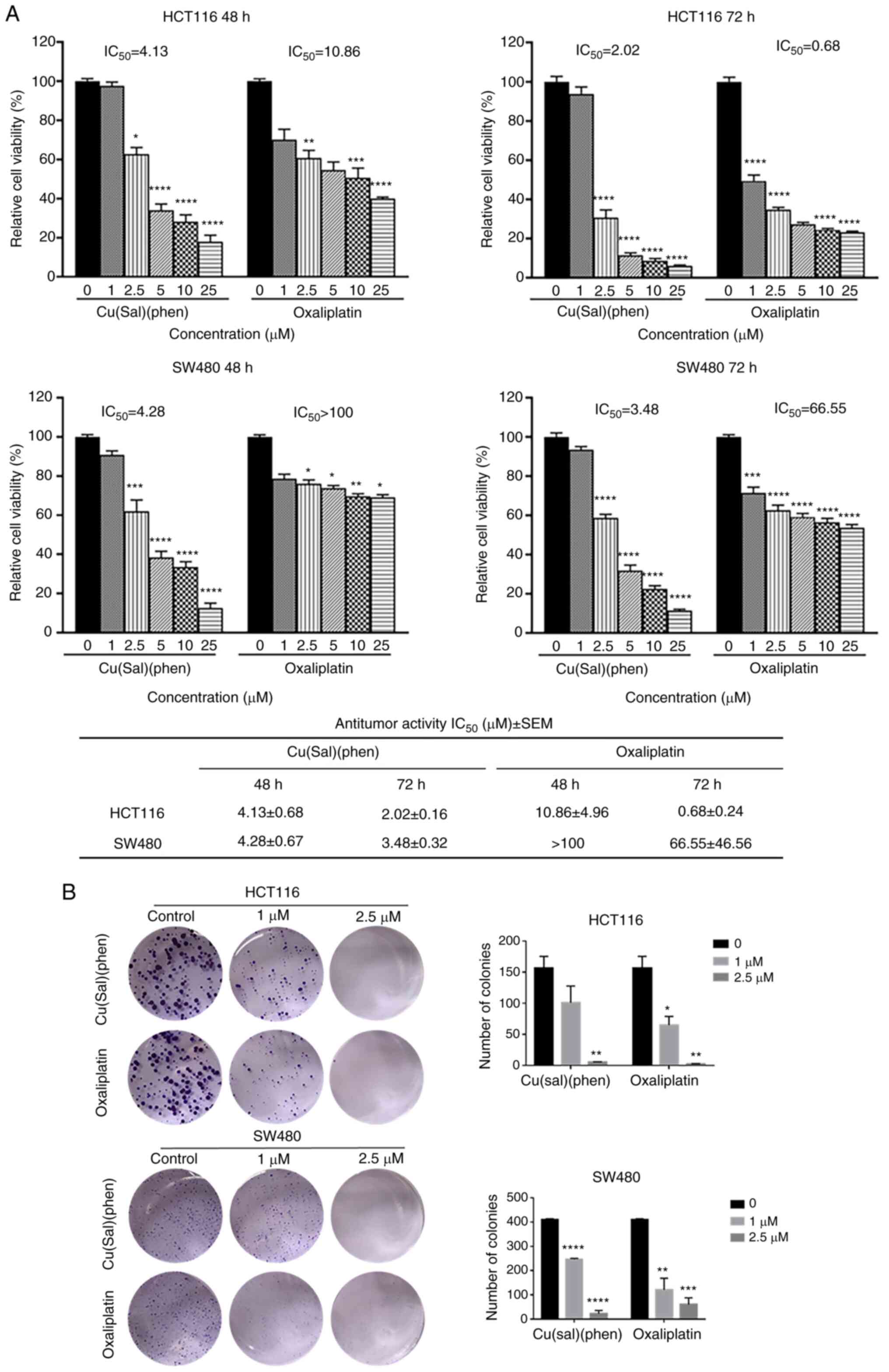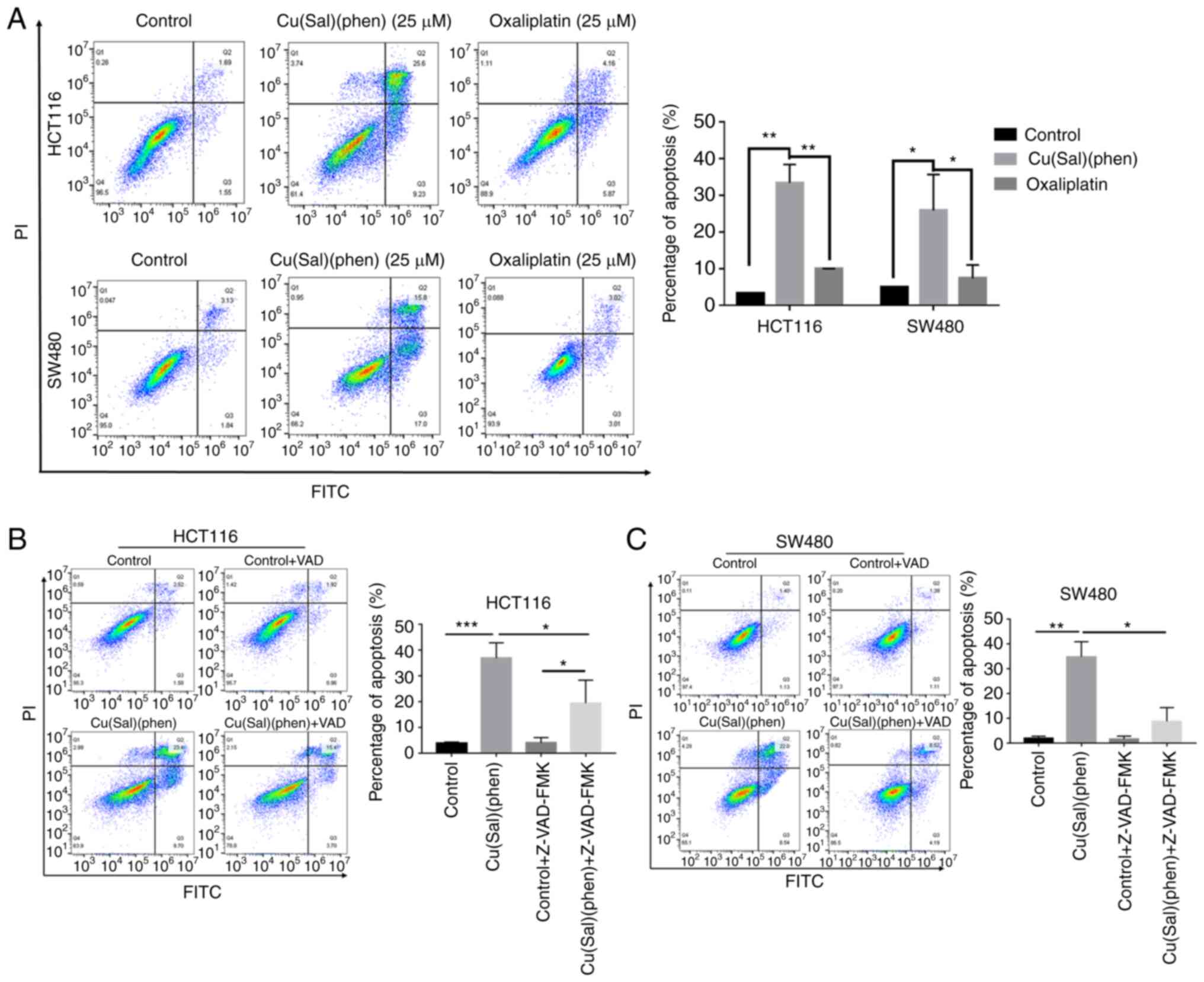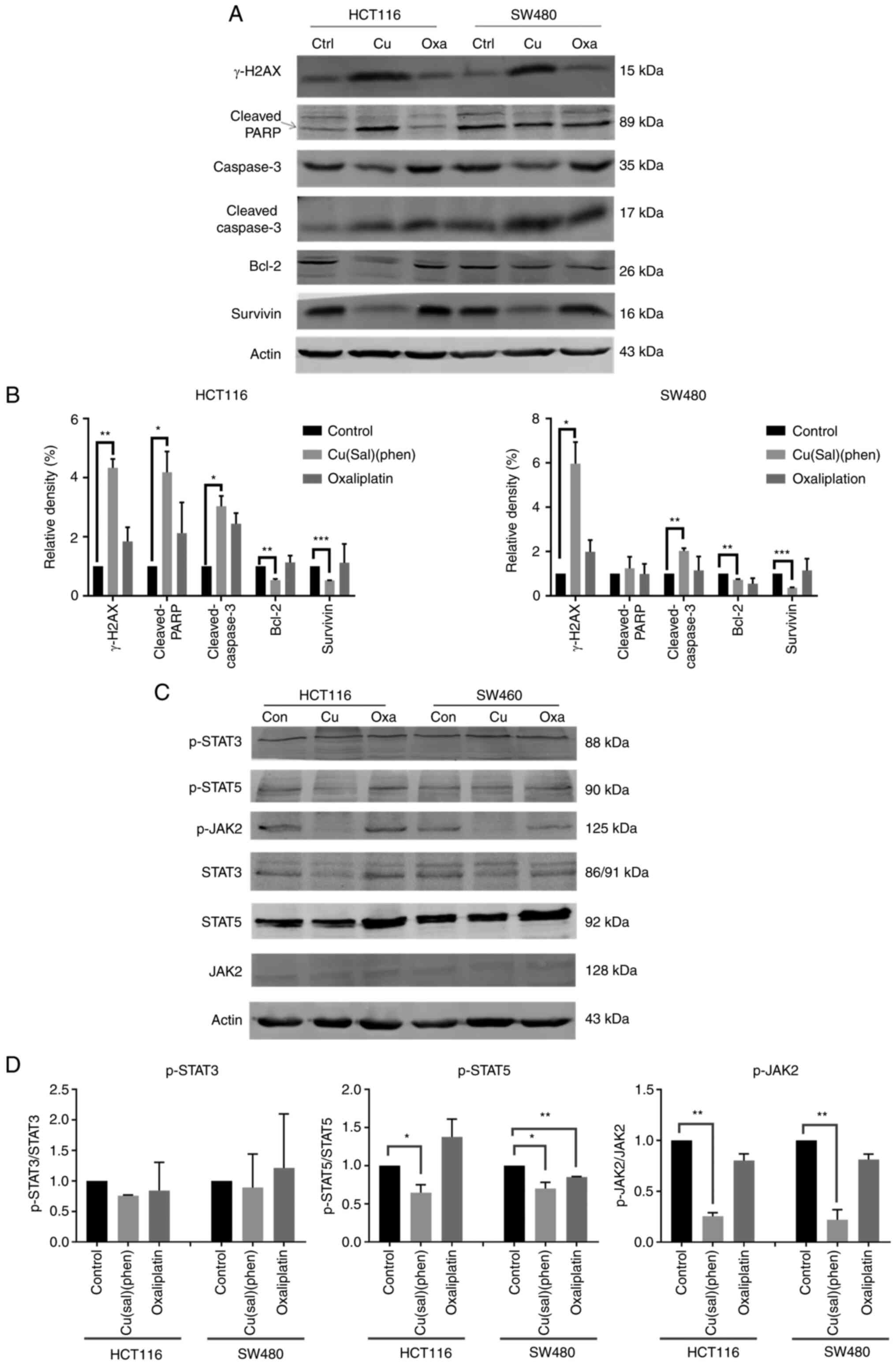|
1
|
Sung H, Ferlay J, Siegel RL, Laversanne M,
Soerjomataram I, Jemal A and Bray F: Global cancer statistics 2020:
GLOBOCAN estimates of incidence and mortality worldwide for 36
cancers in 185 countries. CA Cancer J Clin. 71:209–249. 2021.
View Article : Google Scholar : PubMed/NCBI
|
|
2
|
Lu WQ, Hu YY, Lin XP and Fan W: Knockdown
of PKM2 and GLS1 expression can significantly reverse
oxaliplatin-resistance in colorectal cancer cells. Oncotarget.
8:44171–44185. 2017. View Article : Google Scholar : PubMed/NCBI
|
|
3
|
Asadzadeh Z, Mansoori B, Mohammadi A,
Kazemi T, Mokhtarzadeh A, Shanehbandi D, Hemmat N, Derakhshani A,
Brunetti O, Safaei S, et al: The combination effect of Prominin1
(CD133) suppression and Oxaliplatin treatment in colorectal cancer
therapy. Biomed Pharmacother. 137:1113642021. View Article : Google Scholar : PubMed/NCBI
|
|
4
|
Li Y, Sun Z, Cui Y, Zhang H, Zhang S, Wang
X, Liu S and Gao Q: Oxaliplatin derived monofunctional
triazole-containing platinum(II) complex counteracts
oxaliplatin-induced drug resistance in colorectal cancer. Bioorg
Chem. 107:1046362021. View Article : Google Scholar : PubMed/NCBI
|
|
5
|
Chen W, Lian W, Yuan Y and Li M: The
synergistic effects of oxaliplatin and piperlongumine on colorectal
cancer are mediated by oxidative stress. Cell Death Dis.
10:6002019. View Article : Google Scholar : PubMed/NCBI
|
|
6
|
Martinez-Balibrea E, Martínez-Cardús A,
Ginés A, Ruiz de Porras V, Moutinho C, Layos L, Manzano JL, Bugés
C, Bystrup S, Esteller M and Abad A: Tumor-related molecular
mechanisms of oxaliplatin resistance. Mol Cancer Ther.
14:1767–1776. 2015. View Article : Google Scholar : PubMed/NCBI
|
|
7
|
Buchholz A, Sahmoun AE and Kurniali PC:
Characteristics of colorectal patients who discontinued oxaliplatin
therapy. J Clin Oncol. 37 (Suppl):e151552019. View Article : Google Scholar
|
|
8
|
Zedan AH, Hansen TF, Svenningsen ÅF and
Vilholm OJ: Oxaliplatin-induced neuropathy in colorectal cancer:
Many questions with few answers. Clin Colorectal Cancer. 13:73–80.
2014. View Article : Google Scholar : PubMed/NCBI
|
|
9
|
Ali A, Mishra S, Kamaal S, Alarifi A,
Afzal M, Saha KD and Ahmad M: Evaluation of catacholase mimicking
activity and apoptosis in human colorectal carcinoma cell line by
activating mitochondrial pathway of copper(II) complex coupled with
2-(quinolin-8-yloxy)(methyl)benzonitrile and 8-hydroxyquinoline.
Bioorg Chem. 106:1044792021. View Article : Google Scholar : PubMed/NCBI
|
|
10
|
Zehra S, Tabassum S and Arjmand F:
Biochemical pathways of copper complexes: Progress over the past 5
years. Drug Discov Today. 26:1086–1096. 2021. View Article : Google Scholar : PubMed/NCBI
|
|
11
|
Song W, Xu P, Zhi S, Zhu S, Guo Y and Yang
H: Integrated transcriptome and in vitro analysis revealed
antiproliferative effects on human gastric cancer cells by a
benzimidazole-quinoline copper(II) complex. Process Biochem.
102:286–295. 2021. View Article : Google Scholar
|
|
12
|
Sequeira D, Baptista PV, Valente R,
Piedade MFM, Garcia MH, Morais TS and Fernandes AR: Cu(I) complexes
as new antiproliferative agents against sensitive and doxorubicin
resistant colorectal cancer cells: Synthesis, characterization, and
mechanisms of action. Dalton Trans. 50:1845–1865. 2021. View Article : Google Scholar : PubMed/NCBI
|
|
13
|
Radhakrishnan K, Khamrang T, Sambantham K,
Sali VK, Chitgupi U, Lovell JF, Mohammad AA and Venugopal R:
Identification of cytotoxic copper(II) complexes with
phenanthroline and quinoline, quinoxaline or quinazoline-derived
mixed ligands. Polyhedron. 194:1148862021. View Article : Google Scholar
|
|
14
|
Mahendiran D, Kumar RS, Viswanathan V,
Velmurugan D and Rahiman AK: Targeting of DNA molecules, BSA/c-Met
tyrosine kinase receptors and anti-proliferative activity of
bis(terpyridine)copper(ii) complexes. Dalton Trans. 45:7794–7814.
2016. View Article : Google Scholar : PubMed/NCBI
|
|
15
|
Gou Y, Chen M, Li S, Deng J, Li J, Fang G,
Yang F and Huang G: Dithiocarbazate-copper complexes for bioimaging
and treatment of pancreatic cancer. J Med Chem. 64:5485–5499. 2021.
View Article : Google Scholar : PubMed/NCBI
|
|
16
|
Chen X, Dou QP, Liu J and Tang D:
Targeting ubiquitin- proteasome system with copper complexes for
cancer therapy. Front Mol Biosci. 8:6491512021. View Article : Google Scholar : PubMed/NCBI
|
|
17
|
Cui Q, Wang JQ, Assaraf YG, Ren L, Gupta
P, Wei L, Ashby CR Jr, Yang DH and Chen ZS: Modulating ROS to
overcome multidrug resistance in cancer. Drug Resist Updat.
41:1–25. 2018. View Article : Google Scholar : PubMed/NCBI
|
|
18
|
Snezhkina AV, Kudryavtseva AV, Kardymon
OL, Savvateeva MV, Melnikova NV, Krasnov GS and Dmitriev AA: ROS
generation and antioxidant defense systems in normal and malignant
cells. Oxid Med Cell Longev. 2019:61758042019. View Article : Google Scholar : PubMed/NCBI
|
|
19
|
Ng CH, Kong SM, Tiong YL, Maah MJ, Sukram
N, Ahmad M and Khoo ASB: Selective anticancer copper(II)-mixed
ligand complexes: Targeting of ROS and proteasomes. Metallomics.
6:892–906. 2014. View Article : Google Scholar : PubMed/NCBI
|
|
20
|
Polloni L, Seni Silva AC, Teixeira SC,
Azevedo FVPV, Zóia MAP, da Silva MS, Lima PMAP, Correia LIV, do
Couto Almeida J, da Silva CV, et al: Action of copper(II) complex
with β-diketone and 1,10-phenanthroline (CBP-01) on sarcoma cells
and biological effects under cell death. Biomed Pharmacother.
112:1085862019. View Article : Google Scholar : PubMed/NCBI
|
|
21
|
Pfeffer CM and Singh ATK: Apoptosis: A
target for anticancer therapy. Int J Mol Sci. 19:4482018.
View Article : Google Scholar : PubMed/NCBI
|
|
22
|
Banjara S, Suraweera CD, Hinds MG and
Kvansakul M: The Bcl-2 family: Ancient origins, conserved
structures, and divergent mechanisms. Biomolecules. 10:1282020.
View Article : Google Scholar : PubMed/NCBI
|
|
23
|
Sun BB, Fu LN, Wang YQ, Gao QY, Xu J, Cao
ZJ, Chen YX and Fang JY: Silencing of JMJD2B induces cell apoptosis
via mitochondria-mediated and death receptor-mediated pathway
activation in colorectal cancer. J Dig Dis. 15:491–500. 2014.
View Article : Google Scholar : PubMed/NCBI
|
|
24
|
Li D, Hu C and Li H: Survivin as a novel
target protein for reducing the proliferation of cancer cells.
Biomed Rep. 8:399–406. 2018.PubMed/NCBI
|
|
25
|
de Ridder I, Kerkhofs M, Veettil SP,
Dehaen W and Bultynck G: Cancer cell death strategies by targeting
Bcl-2′s BH4 domain. Biochim Biophys Acta Mol Cell Res.
1868:1189832021. View Article : Google Scholar : PubMed/NCBI
|
|
26
|
Guvenc H, Pavlyukov MS, Joshi K, Kurt H,
Banasavadi-Siddegowda YK, Mao P, Hong C, Yamada R, Kwon CH, Bhasin
D, et al: Impairment of glioma stem cell survival and growth by a
novel inhibitor for Survivin-Ran protein complex. Clin Cancer Res.
19:631–642. 2013. View Article : Google Scholar : PubMed/NCBI
|
|
27
|
Lopes JC, Botelho FV, Barbosa Silva MJ,
Silva SF, Polloni L, Alves Machado PH, Rodrigues de Souza T,
Goulart LR, Silva Caldeira PP, Pereira Maia EC, et al: In vitro and
in vivo antitumoral activity of a ternary copper (II) complex.
Biochem Biophys Res Commun. 533:1021–1026. 2020. View Article : Google Scholar : PubMed/NCBI
|
|
28
|
Fan L, Tian M, Liu Y, Deng Y, Liao Z and
Xu J: Salicylate •phenanthroline copper (II) complex induces
apoptosis in triple-negative breast cancer cells. Oncotarget.
8:29823–29832. 2017. View Article : Google Scholar : PubMed/NCBI
|
|
29
|
Sukhdeo K, Paramban RI, Vidal JG, Elia J,
Martin J, Rivera M, Carrasco DR, Jarrar A, Kalady MF, Carson CT, et
al: Multiplex flow cytometry barcoding and antibody arrays identify
surface antigen profiles of primary and metastatic colon cancer
cell lines. PLoS One. 8:e530152013. View Article : Google Scholar : PubMed/NCBI
|
|
30
|
Kreutz D, Bileck A, Plessl K, Wolrab D,
Groessl M, Keppler BK, Meier SM and Gerner C: Response profiling
using shotgun proteomics enables global metallodrug mechanisms of
action to be established. Chemistry. 23:1881–1890. 2017. View Article : Google Scholar : PubMed/NCBI
|
|
31
|
Sun W, Ge Y, Cui JP, Yu YF and Liu BL:
Scutellarin resensitizes oxaliplatin-resistant colorectal cancer
cells to oxaliplatin treatment through inhibition of PKM2. Mol Ther
Oncolytics. 21:87–97. 2021. View Article : Google Scholar : PubMed/NCBI
|
|
32
|
Guo WJ, Ye SS, Cao N, Huang JA, Gao J and
Chen QY: ROS-mediated autophagy was involved in cancer cell death
induced by novel copper(II) complex. Exp Toxicol Pathol.
62:577–582. 2010. View Article : Google Scholar : PubMed/NCBI
|
|
33
|
Cao Y, Wang J, Tian H and Fu GH:
Mitochondrial ROS accumulation inhibiting JAK2/STAT3 pathway is a
critical modulator of CYT997-induced autophagy and apoptosis in
gastric cancer. J Exp Clin Cancer Res. 39:1192020. View Article : Google Scholar : PubMed/NCBI
|
|
34
|
Murphy MP: How mitochondria produce
reactive oxygen species. Biochem J. 417:1–13. 2009. View Article : Google Scholar : PubMed/NCBI
|
|
35
|
Warren CFA, Wong-Brown MW and Bowden NA:
BCL-2 family isoforms in apoptosis and cancer. Cell Death Dis.
10:1772019. View Article : Google Scholar : PubMed/NCBI
|
|
36
|
Peery RC, Liu JY and Zhang JT: Targeting
survivin for therapeutic discovery: Past, present, and future
promises. Drug Discov Today. 22:1466–1477. 2017. View Article : Google Scholar : PubMed/NCBI
|
|
37
|
Jiang F, Zhou JY, Zhang D, Liu MH and Chen
YG: Artesunate induces apoptosis and autophagy in HCT116 colon
cancer cells, and autophagy inhibition enhances the
artesunate-induced apoptosis. Int J Mol Med. 42:1295–1304.
2018.PubMed/NCBI
|
|
38
|
Schütz CS, Stope MB and Bekeschus S: H2A.X
phosphorylation in oxidative stress and risk assessment in plasma
medicine. Oxid Med Cell Longev. 2021:20609862021. View Article : Google Scholar : PubMed/NCBI
|
|
39
|
Johnstone TC, Suntharalingam K and Lippard
SJ: The next generation of platinum drugs: Targeted Pt(II) agents,
nanoparticle delivery, and Pt(IV) prodrugs. Chem Rev.
116:3436–3486. 2016. View Article : Google Scholar : PubMed/NCBI
|
|
40
|
Gałczyńska K, Drulis-Kawa Z and Arabski M:
Antitumor activity of Pt(II), Ru(III) and Cu(II) complexes.
Molecules. 25:34922020. View Article : Google Scholar : PubMed/NCBI
|
|
41
|
Wang NN, Zhang PZ, Zhang J, Wang HN, Li L,
Ren F, Dai PF, Li H and Lv XF: Penfluridol triggers
mitochondrial-mediated apoptosis and suppresses glycolysis in
colorectal cancer cells through down-regulating hexokinase-2. Anat
Rec (Hoboken). 304:520–530. 2021. View Article : Google Scholar : PubMed/NCBI
|
|
42
|
Cui Q, Wen S and Huang P: Targeting cancer
cell mitochondria as a therapeutic approach: Recent updates. Future
Med Chem. 9:929–949. 2017. View Article : Google Scholar : PubMed/NCBI
|
|
43
|
Kleih M, Böpple K, Dong M, Gaißler A,
Heine S, Olayioye MA, Aulitzky WE and Essmann F: Direct impact of
cisplatin on mitochondria induces ROS production that dictates cell
fate of ovarian cancer cells. Cell Death Dis. 10:8512019.
View Article : Google Scholar : PubMed/NCBI
|
|
44
|
Xia S, Miao Y and Liu S: Withaferin A
induces apoptosis by ROS-dependent mitochondrial dysfunction in
human colorectal cancer cells. Biochem Biophys Res Commun.
503:2363–2369. 2018. View Article : Google Scholar : PubMed/NCBI
|
|
45
|
Kowol CR, Heffeter P, Miklos W, Gille L,
Trondl R, Cappellacci L, Berger W and Keppler BK: Mechanisms
underlying reductant-induced reactive oxygen species formation by
anticancer copper(II) compounds. J Biol Inorg Chem. 17:409–423.
2012. View Article : Google Scholar : PubMed/NCBI
|
|
46
|
Basak D, Uddin MN and Hancock J: The role
of oxidative stress and its counteractive utility in colorectal
cancer (CRC). Cancers (Basel). 12:33362020. View Article : Google Scholar : PubMed/NCBI
|
|
47
|
Moloney JN and Cotter TG: ROS signalling
in the biology of cancer. Semin Cell Dev Biol. 80:50–64. 2018.
View Article : Google Scholar : PubMed/NCBI
|
|
48
|
Yang F, Pei R, Zhang Z, Liao J, Yu W, Qiao
N, Han Q, Li Y, Hu L, Guo J, et al: Copper induces oxidative stress
and apoptosis through mitochondria-mediated pathway in chicken
hepatocytes. Toxicol In vitro. 54:310–316. 2019. View Article : Google Scholar : PubMed/NCBI
|
|
49
|
Tsvetkov P, Coy S, Petrova B, Dreishpoon
M, Verma A, Abdusamad M, Rossen J, Joesch-Cohen L, Humeidi R,
Spangler RD, et al: Copper induces cell death by targeting
lipoylated TCA cycle proteins. Science. 375:1254–1261. 2022.
View Article : Google Scholar : PubMed/NCBI
|
|
50
|
Piché A, Grim J, Rancourt C, Gómez-Navarro
J, Reed JC and Curiel DT: Modulation of Bcl-2 protein levels by an
intracellular anti-Bcl-2 single-chain antibody increases
drug-induced cytotoxicity in the breast cancer cell line MCF-7.
Cancer Res. 58:2134–2140. 1998.PubMed/NCBI
|
|
51
|
Tanioka M, Nokihara H, Yamamoto N, Yamada
Y, Yamada K, Goto Y, Fujimoto T, Sekiguchi R, Uenaka K, Callies S
and Tamura T: Phase I study of LY2181308, an antisense
oligonucleotide against survivin, in patients with advanced solid
tumors. Cancer Chemother Pharmacol. 68:505–511. 2011. View Article : Google Scholar : PubMed/NCBI
|
|
52
|
Chen Y, Zhou Q, Zhang L, Zhong Y, Fan G,
Zhang Z, Wang R, Jin M, Qiu Y and Kong D: Stellettin B induces
apoptosis in human chronic myeloid leukemia cells via targeting
PI3K and Stat5. Oncotarget. 8:28906–28921. 2017. View Article : Google Scholar : PubMed/NCBI
|
|
53
|
Niu D, Wang D, Fan L, Liu Z, Chen M, Zhang
W and Liu Y, Xu J and Liu Y: The copper (II) complex of salicylate
phenanthroline inhibits proliferation and induces apoptosis of
hepatocellular carcinoma cells. Environ Toxicol. 38:1384–1394.
2023. View Article : Google Scholar : PubMed/NCBI
|



















